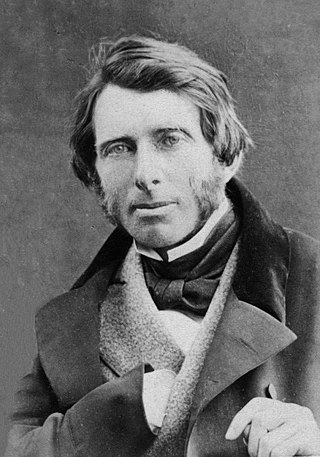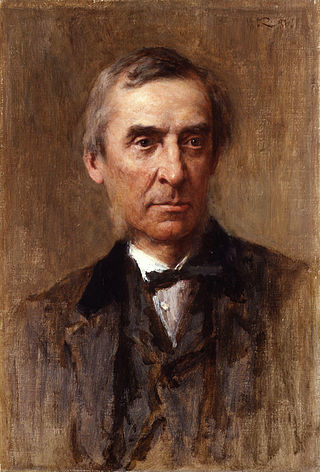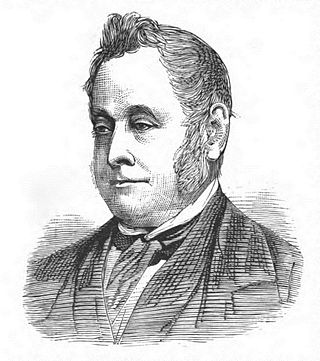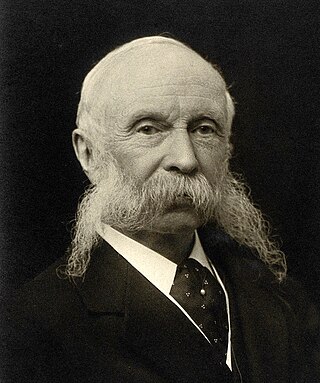Related Research Articles

John Ruskin was an English writer, philosopher, art historian, art critic and polymath of the Victorian era. He wrote on subjects as varied as geology, architecture, myth, ornithology, literature, education, botany and political economy.

John Henry Newman was an English theologian, academic, philosopher, historian, writer, and poet, first as an Anglican priest and later as a Catholic priest and cardinal, who was an important and controversial figure in the religious history of England in the 19th century. He was known nationally by the mid-1830s, and was canonised as a saint in the Catholic Church in 2019.

Thomas Carlyle was a Scottish essayist, historian, and philosopher from the Scottish Lowlands. A leading writer of the Victorian era, he exerted a profound influence on 19th-century art, literature, and philosophy.

James Payn was an English novelist and editor. Among the periodicals he edited were Chambers's Journal in Edinburgh and the Cornhill Magazine in London.

James Anthony Froude was an English historian, novelist, biographer, and editor of Fraser's Magazine. From his upbringing amidst the Anglo-Catholic Oxford Movement, Froude intended to become a clergyman, but doubts about the doctrines of the Anglican church, published in his scandalous 1849 novel The Nemesis of Faith, drove him to abandon his religious career. Froude turned to writing history, becoming one of the best-known historians of his time for his History of England from the Fall of Wolsey to the Defeat of the Spanish Armada.

Sir Peter Courtney Quennell was an English biographer, literary historian, editor, essayist, poet, and critic. He wrote extensively on social history. In his Times obituary he was described as "the last genuine example of the English man of letters". Anthony Powell called him "The Last of the Mandarins".

William George Ward was an English theologian and mathematician. A Roman Catholic convert, his career illustrates the development of religious opinion at a time of crisis in the history of English religious thought.
Sir James Thomas Knowles was an English architect and editor. He was intimate with the poet Alfred, Lord Tennyson and the founder of the Metaphysical Society to encourage rapprochement between religion and science.

Richard Holt Hutton was an English journalist of literature and religion.

The Nineteenth Century was a British monthly literary magazine founded in 1877 by James Knowles. It is regarded by historians as 'one of the most important and distinguished monthlies of serious thought in the last quarter of the nineteenth century'.

Sir Henry Taylor was an English dramatist and poet, Colonial Office official, and man of letters.

Francis William Newman was an English classical scholar and moral philosopher, prolific miscellaneous writer and activist for vegetarianism and other causes.

The Cornhill Magazine (1860–1975) was a monthly Victorian magazine and literary journal named after the street address of the founding publisher Smith, Elder & Co. at 65 Cornhill in London. In the 1860s, under the editorship of William Makepeace Thackeray, the paper's large circulation peaked around 110,000. Due to emerging competitors, circulation fell to 20,000 by 1870. The following year, Leslie Stephen took over as editor. When Stephen left in 1882, circulation had further fallen to 12,000. The Cornhill was purchased by John Murray in 1912, and continued to publish issues until 1975.

Lawrence Goldman is an English historian and academic. He is the former director the Oxford Dictionary of National Biography and of the Institute of Historical Research, University of London. He has a PhD from the University of Cambridge.

Sir James Crichton-Browne MD FRS FRSE was a leading Scottish psychiatrist, neurologist and eugenicist. He is known for studies on the relationship of mental illness to brain injury and for the development of public health policies in relation to mental health. Crichton-Browne's father was the asylum reformer Dr William A.F. Browne, a prominent member of the Edinburgh Phrenological Society and, from 1838 until 1857, the superintendent of the Crichton Royal at Dumfries where Crichton-Browne spent much of his childhood.

The Nemesis of Faith is an epistolary philosophical novel by James Anthony Froude published in 1849. Partly autobiographical, the novel depicts the causes and consequences of a young priest's crisis of faith. Like many of his contemporaries, Froude came to question his Christian faith in light of early nineteenth century developments in history, theology, and science. Froude was particularly influenced by the Catholic teachings of the Oxford Movement and by the new approach to religious scholarship developed by the German Higher Critics.

Alexander Munro was a British sculptor of the Pre-Raphaelite movement. He concentrated on portraiture and statues, but is best known for his Rossetti-influenced figure-group Paolo and Francesca (1852), which has often been identified as the epitome of Pre-Raphaelite sculpture.

Samuel Laurence was a British portrait painter.
The Great Writers series was a collection of literary biographies published in London from 1887, by Walter Scott & Co. The founding editor was Eric Sutherland Robertson, followed by Frank T. Marzials.
"The Higher Pantheism" is an 1867 poem by Alfred, Lord Tennyson, in which Tennyson presents a view of God as subsisting throughout the material world. The poem drew both praise and criticism, as well as examination of its inspirations in the words of Tennyson's contemporaries.
References
Citations
- ↑ Metcalf, Priscilla (1980). James Knowles: Victorian Editor and Architect. Oxford University Press. pp. 215–217.
- ↑ Metcalf, Knowles, pp. 216-217
- 1 2 One or more of the preceding sentences incorporates text from a publication now in the public domain : Chisholm, Hugh, ed. (1911). "Knowles, Sir James". Encyclopædia Britannica . Vol. 15 (11th ed.). Cambridge University Press. pp. 876–877.
- ↑ Christopher A. Kent, "Metaphysical Society (act. 1869–1880)", Oxford Dictionary of National Biography , Oxford University Press, (http://www.oxforddnb.com/view/theme/45584), 2004. Retrieved 15 April 2013.
- ↑ Metcalf, Knowles, p. 225
- ↑ "The Metaphysical Society. A Reminiscence" by R. H. Hutton, published in 1885 in The Nineteenth Century magazine.
Bibliography
- Brown, Alan Willard The Metaphysical Society: Victorian Minds in Crisis, 1869–1880. New York: Columbia U.P., 1947.
- The papers of the Metaphysical Society, 1869–1880 : a critical edition, Oxford ; New York : Oxford University Press, 2015, 3 volumes.
- Catherine Marshall; Bernard V Lightman; Richard England, The Metaphysical Society (1869–1880) : intellectual life in mid-Victorian England, Oxford ; New York, NY : Oxford University Press, 2019.